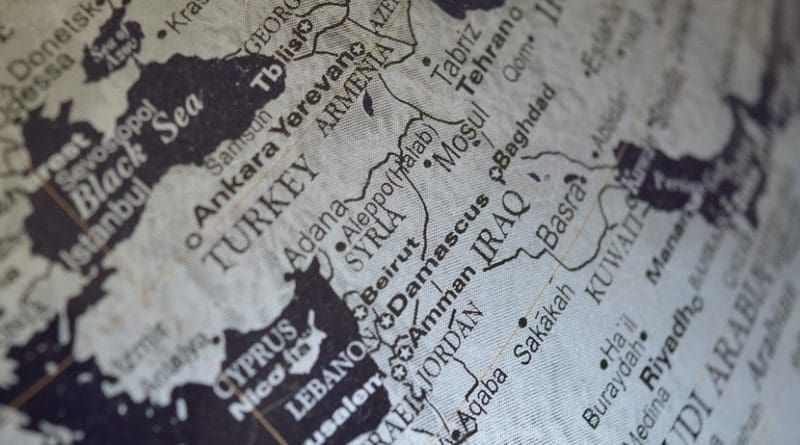Iran Places Iraq’s EU Trade Relationship At Risk – Analysis
By Lisa Moore*
The European Union (EU) is Iraq’s second-largest trading partner. Although this partnership is of critical importance to Iraq, the EU’s commitment to continuing trade relations is facing a major stress test.
Broadly speaking, there are two key factors underpinning the EU’s uncertainty towards Iraq. Firstly, the Euro-Mediterranean Human Rights Monitor is demanding a sanction response from the EU following the brutal repression of anti-Iran protestors by Iran-backed Iraqi security services. Secondly, the European Parliament is increasingly concerned by the invasive geo-strategic and geo-economic influence that Iran holds over Iraq’s mainstream political establishment.
According to the World Bank, foreign trade accounts for almost 80 percent of Iraq’s gross domestic product. Unsurprisingly, Iraq’s trade balance with the EU is dominated by the export of crude oil and auxiliary hydrocarbon products. In spite of its strong trade surplus, Iraq’s trade-based economy remains heavily reliant on European economies for agricultural chemicals and foodstuffs, industrial machinery, motor vehicles, and medical supplies.
If Baghdad cannot placate the angry calls to action from Brussels, the European Parliament could choose to suspend the EU-Iraq Partnership and Cooperation Agreement, a cornerstone economic agreement that describes the implementation protocols for bilateral trade policies, transitional developmental objectives, and market economy reforms. As trade relations continue to deteriorate with the EU, Iraq’s reluctance to act against Iran is not only imperiling its economy, it is also concertizing its reputation within the international community as an unreliable bilateral trade partner.
How Much Influence Does Iran Really Wield in Iraq?
Since the U.S. withdrawal in 2003, Iraq has suffered under the authoritarian influence of Iran. For nearly two decades, the Iraqi government has been complicit in a sustained Iranian campaign to undermine Iraqi sovereignty and degrade its military capabilities. From Tehran’s perspective, the primary purpose of this campaign is to mold Iraq into an Iranian client state – enough strength to repress domestic revolution, but not so much that it’s able to break away from Iran’s orbit. Preventing the emergence of a strong, globally connected Iraqi economy is a key element in Iran’s hegemonic ambitions for Iraq and the broader Middle East.
In the service of this vision, the Iranian government has spent years carving out a sizable tract of influence within the Iraqi political-military establishment. Instead of confronting Iran’s repeated sovereignty violations, the Iraqi government—an institution which remains dominated by run-of-the-mill corruption and pro-Iran special interest groups—has chosen instead to pursue a dedicated policy of obfuscation and denial. Absent government intervention, Iran has been free to use this bastion of power to project its own economic influence while simultaneously hamstringing the diversification and growth of the Iraqi economy. Through this political influence, Iran has had no qualms leveraging its power base—from brazenly bankrolling Shia-majority parliamentary blocs to financing the pro-Iran Popular Mobilization Forces—to implant sympathetic actors within the formal structures of Iraq’s state economy. In addition to fostering a generalized culture of corruption within Iraq’s major channels of governance, Iranian soft power has also been used to pressure public officials into awarding financial support grants and reconstruction contracts to Iran-backed corporate and paramilitary entities.
Tehran’s soft power initiative occur in tandem with an increase in its hard power assets. According to leaked intelligence reports, Iran maintains an extensive foreign intelligence network—staffed by operatives of the notorious Islamic Revolutionary Guard Corps—within key Iraqi provinces. Besides monitoring grassroots political sentiment and paying off public officials, this network is also responsible for coordinating local militant affiliates and entrenching Iran’s chain of non-static foreign military installations. If the EU values its relationship with Iraq, it should surely seek to curtail Iran’s flagrant annexation of Iraq’s political autonomy.
Political and Economic Independence Synonymous
Since the imposition of U.S. trade restrictions, Iran has leveraged its overland oil trade with Iraq to cushion the domestic economic impact of tightening sanctions. In addition to depriving the Iraqi economy of market priced oil, this arrangement has also contributed to the deterioration of EU-Iraq trade relations. With tightening sanctions placed on Iranian exports, the EU must now place far more scrutiny on what it imports from Iraq as to ensure no Iranian oil is accidentally procured.
By extricating itself from its one-sided, extractive partnership with Iran, Iraq will not only improve trade relations with the EU, it’ll also free up additional oil provisions for international export.
Iraq’s oil-based trade surplus is not the only thing that benefits from the jettisoning of Iran’s invasive political influence. Without the constraining mandates of Iranian special interest groups, Iraq’s regulatory authorities can finally tackle the systemic drivers of corruption underpinning almost every strata of the Iraqi government. To do so however, Baghdad will need to change tack and place Iraqi sovereignty and independent at the forefront of its strategy. If pro-sovereignty and Tehran-rejectionist messaging – like that seen in Iraq’s National Wisdom Council and the National Independent Iraqi Front – can reach Baghdad, then Iraq stands a chance to instill confidence its European and global trade partners.
For now, Iran is the only barrier preventing a more robust economic partnership between the resource-rich Iraq and technically advanced EU. With Iran out of the picture, the EU is well positioned to revive Iraq’s flagging economy and assist its citizens. By providing strong import demand, comprehensive developmental assistance, and support throughout the reform process, the EU can play a pivotal role in re-integrating Iraq back into the broader international community.
*Lisa Moore is New York-based freelance journalist writing on global political affairs. She also acts as an external adviser to news corporations assisting with their journalism endeavors in regards to political and current affairs.

